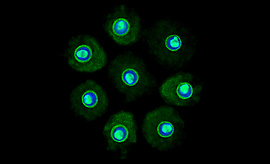The histone chaperone CAF-1 cooperates with the DNA methyltransferases to maintain Cd4 silencing in cytotoxic T cells
The transcriptional repression of alternative lineage genes is critical for cell fate commitment. Mechanisms by which locus-specific gene silencing is initiated and heritably maintained during cell division are not clearly understood. To study the maintenance of silent gene states, we investigated how the Cd4 gene is stably repressed in CD8+ T cells. Through CRISPR and shRNA screening, we identified the histone chaperone CAF-1 as a critical component for Cd4 repression. We found that the large subunit of CAF-1, Chaf1a, requires the N-terminal KER domain to associate with the histone deacetylases HDAC1/2 and the histone demethylase LSD1, enzymes that also participate in Cd4 silencing. When CAF-1 was lacking, Cd4 derepression was markedly enhanced in the absence of the de novo DNA methyltransferase Dnmt3a but not the maintenance DNA methyltransferase Dnmt1. In contrast to Dnmt1, Dnmt3a deficiency did not significantly alter levels of DNA methylation at the Cd4 locus. Instead, Dnmt3a deficiency sensitized CD8+ T cells to Cd4 derepression mediated by compromised functions of histone-modifying factors, including the enzymes associated with CAF-1. Thus, we propose that the heritable silencing of the Cd4 gene in CD8+ T cells exploits cooperative functions among the DNA methyltransferases, CAF-1, and histone-modifying enzymes.



